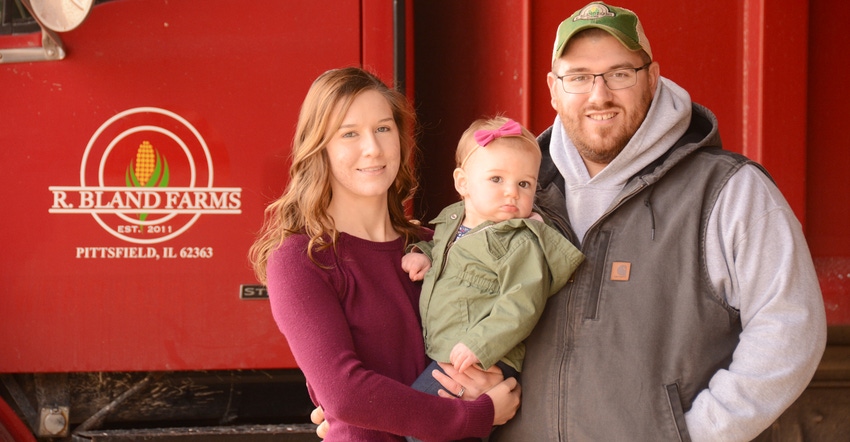
Is agriculture still a good bet, even after 2019? Prairie Farmer caught up with several young Illinois farmers from our Cultivating Master Farmers program to ask them what they’re concerned about coming out of 2019 and heading into 2020.
Here’s what they had to say, plus what they’ll do differently in 2020 and the opportunities they see on the horizon.
First are Ryan and Amanda Bland, Pittsfield (pictured above):
Concerns?
“The major thing would just be surviving and making sure our bankers want to renew our notes. We paid everything off and made a small profit. 2019 gave us reason to be leery about water, and we’re 8% more saturated now than this time last year. They’re already talking here about near-record flooding for this year. None of our ground goes under water, but we lose access to and from.”
Plans?
“We’ve acquired more ground, plus I picked up more equipment. That means our costs are up dramatically. We’re not cutting corners but watching pennies and shopping around more for inputs.
“We carry crop insurance to the max now. As a first-generation startup farmer — basically buying everything from scratch — I don’t have a lot of room for error.”
Opportunities?
“After the year that most guys had in ’19, we’re seeing a lot of people entering early retirement or backing off on some of the ground. Been a ton of opportunities even since harvest that we’ve acquired some better ground. I see opportunities for myself and other young guys as some older guys decide they don’t want to monkey with the weather and everything else.”
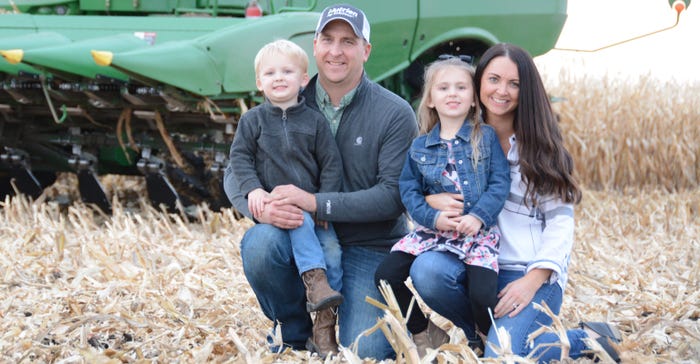
Seth and Jessica Lambert, with Rhett and Addison, Macomb, Ill.

Concerns?
“After the last 16 to 18 months of extreme weather, we are somewhat gun-shy about what to expect in the months to come. We are praying for more seasonable weather patterns and fewer extremes.”
Plans?
“With the average- to below-average yields and lower-than-normal commodity prices, 2019 was basically a breakeven year for us. Our goal is to conserve cash and use it on essentials for our farming operation. Any big purchases made will be ones that we will be able to see a fast return on our money.”
Opportunities?
“Last fall, we saw a lot of farm ground change hands locally for various reasons, and I can only imagine this pattern will continue in the coming years. It’s important to be patient; opportunities will arise where you least expect them. It seems like we are getting closer to trade agreements with China that should help restore more favorable grain markets. Since we have been able to get a majority of our fall field work done, we are set up to raise a good crop for 2020.”
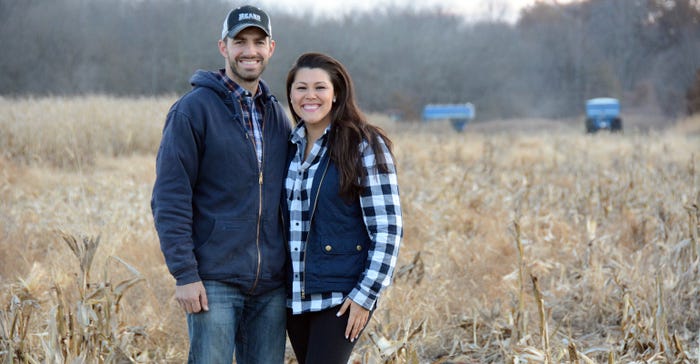
Justin and Jessica Lane, Virginia, Ill.

Concerns?
“We are taking a hard look at whether we have the right mix of labor and equipment to plant and harvest in a timely manner. We also have very little fertilizer on at this point, so getting that completed before spring will be a challenge.”
Plans?
“Couple lower-than-expected yields with low corn and bean prices, and we’re analyzing every aspect of the operation to reduce expenses. Planning on higher prices to improve profit has proven to be futile.”
Opportunities?
“We have significant opportunities to improve operational efficiency. If we can divide responsibilities among our team and our equipment performs better than 2019 — and Mother Nature cooperates a bit more — we’ll have a chance to be more profitable in 2020. I hope that 2019 is nearly as bad as it can get and have higher hopes for a better 2020.”
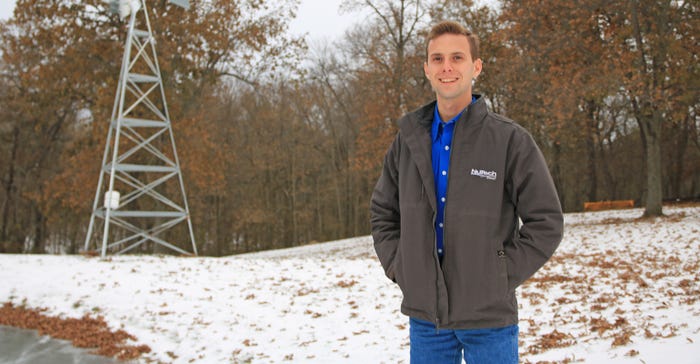
Clint Gorden, Mount Auburn, Ill.

Concerns?
“Prices. We have been waiting awhile to see some change, but corn and soybeans haven’t changed much in the last month.”
Plans?
“I’m trying to become a better marketer. Looking into other input options — wholesale — has helped me save dollars in the past, and I intend to do that going forward.”
Opportunities?
“I try to stay positive. Hoping for better yields than 2019. New technologies have been released in the last year that could be a game-changer for production. I see some good marketing opportunities in the next few months for both new and old crop. Half the fun — and sometimes not fun — in agriculture is the uncertainty.”
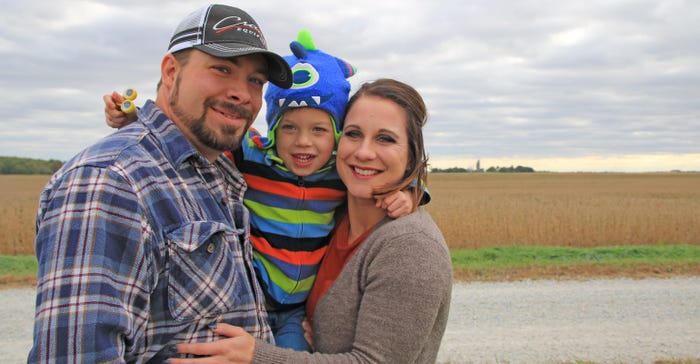
Mike and Amanda Nelson and son Owen, Paxton, Ill.

Concerns?
“I was thankfully able to make it out of 2019 in pretty decent shape. However, given reduced yields and the current marketing outlook, cash flow may be tighter than in previous years. Having a good, honest relationship with your lender and utilizing an operating loan may be even more important to allow you to make sales based more on the market and less on the need for cash.”
Plans?
“No dramatic changes. I may consider increasing crop insurance levels, but need to run some more projections before making any final decisions. We’re also making an effort to cut back in some areas of our family living.”
Opportunities?
“Modern seed genetics and growing practices have allowed us to grow a better crop, with less-than-ideal growing conditions, than ever before. I believe the long-term trend for yield and net income is upward.
“As I look around the farming industry, I see a lot of farmers who, through many years of hard work, have built their living into something to be very proud of. I can’t help but wonder how many might be thinking that they’ve already been through their fair share of the tough years. There may be expansion opportunities ahead for the young farmer who is willing to put in the hard work.”
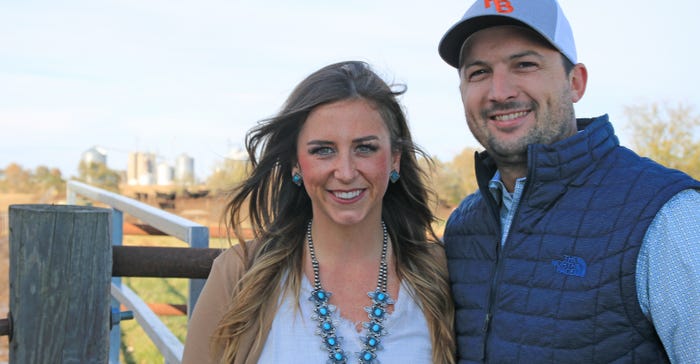
Reeder and Lena Head, Blue Mound, Ill.

Concerns?
“I’m concerned about how the effects of the wet spring of 2019 will affect us in 2020. We planted in some very marginal conditions in several fields. We tried to get most of those fields worked this fall, but it takes time to undo those kinds of problems. We grow mostly non-GMO beans, and there was some weed pressure last year with all the rain, so we are trying to get plans in place to manage them if they are bad again this growing season.”
Plans?
“They will stay the same, as we just formed a new LLC within our family. Our plan is to try and to continue to grow the farming operation in incremental growth.”
Opportunities?
“We should see the cattle market rebound a little this coming year, as there’s been a lot of cows sent to market as guys are, unfortunately, getting out of the industry. I think there will be some opportunities in the grain market, as well. China will hopefully start to recover from the African swine fever, which in turn means they will need more feed.”
Read more about:
Cultivating Master FarmersAbout the Author(s)
You May Also Like






